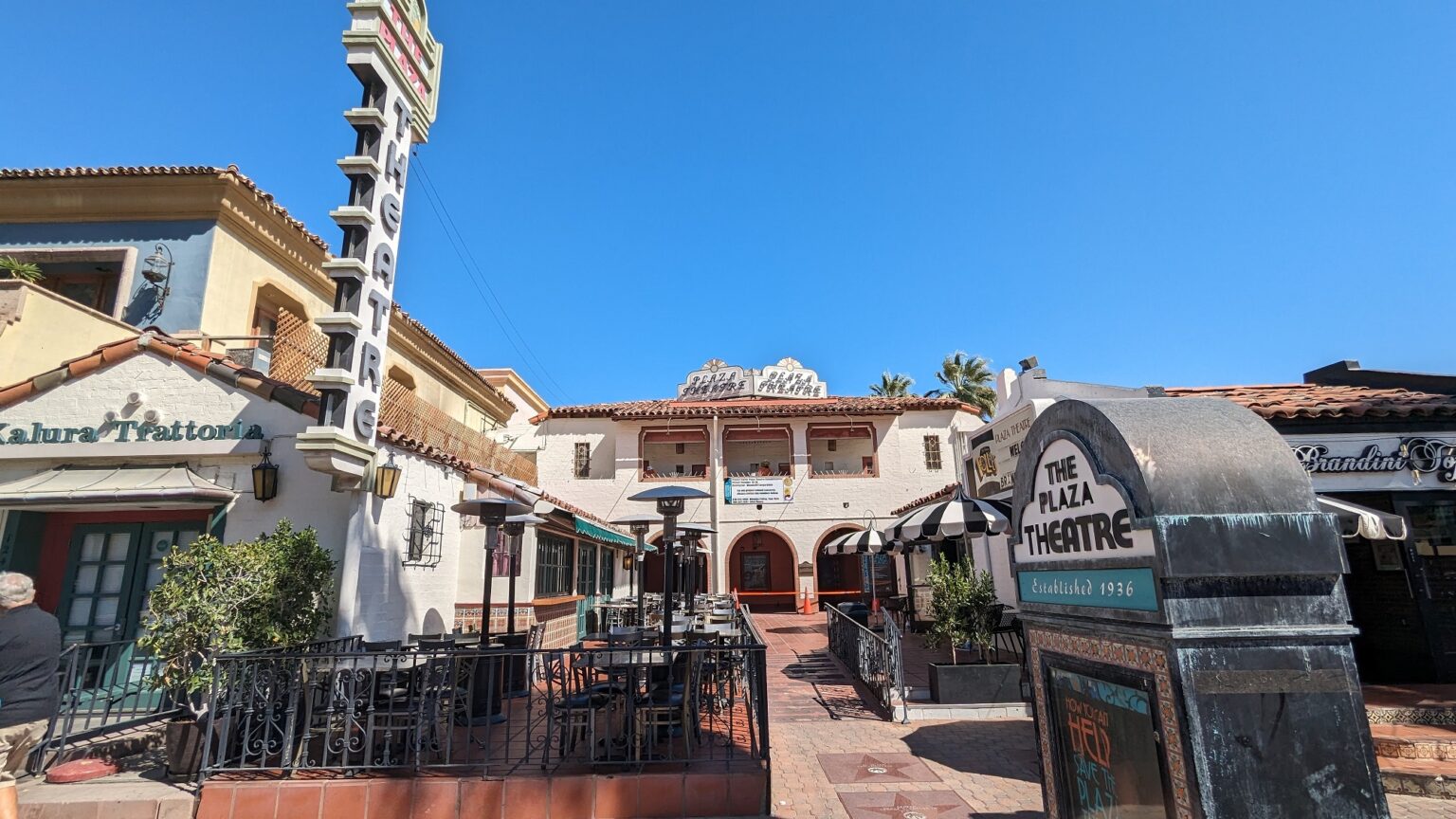For nearly a century, the historic Plaza Theatre in downtown Palm Springs has been a cornerstone of the city’s cultural and artistic heritage. The 800-seat venue, which opened in 1936, has hosted iconic events hosted by the Palm Springs International Film Festival to performances of the beloved “Fabulous Palm Springs Follies.” Today, the theatre sits at the heart of an ambitious $34 million restoration project aimed at revitalizing this cultural gem and cementing Palm Springs’ status as a premier destination for arts and entertainment. But as the restoration reaches a critical juncture, controversy over the city’s use of eminent domain to acquire a nearby property has cast a shadow over the project.
Revitalizing a Historic Landmark
The Plaza Theatre’s significance is undeniable. Recognized as a Class 1 Historic Site by the city, it has long symbolized Palm Springs’ rich cultural history. In 2015, the City of Palm Springs acquired the theatre from its former redevelopment agency, committing to its preservation as a performing arts venue. The restoration project, which began in earnest in 2022, aims to modernize the facility while preserving its historic charm. Planned upgrades include state-of-the-art lighting and sound systems, structural improvements, and enhanced accessibility, ensuring the theatre meets 21st-century standards.
Efforts to fund the restoration have been extensive. The Palm Springs Plaza Theatre Foundation, formed to spearhead fundraising, has secured $14 million in private donations, including significant contributions from the Oak View Group, operators of Acrisure Arena, and individuals passionate about preserving the city’s cultural legacy. The City of Palm Springs has allocated $20 million to the project, using funds from Measure J and General Fund reserves. The city expects the fully restored theatre to open in late 2025, reinvigorating downtown Palm Springs as a hub for arts and tourism.
The Controversy: A 10-Foot Easement
As construction progresses, a critical issue has emerged: California building codes require a 20-foot ingress and egress easement to ensure safe emergency access for large venues. Currently, the city has only a 10-foot easement leading to the theatre, leaving it noncompliant with safety standards. The additional space is part of the patio of Kalura Trattoria, a popular Italian restaurant that has operated next to the theatre for 22 years. Negotiations between the city and Grit Development, the property owner, have stalled, prompting the city council to initiate eminent domain proceedings by voting in favor of initiating a resolution of necessity at its November 21 meeting.
City Attorney Jeffrey Ballinger defended the decision, emphasizing the public safety necessity of widening the easement. “A 20-foot ingress/egress easement is required under state building codes, particularly for a venue of this size,” Ballinger explained during the city council meeting. He described the city’s efforts to resolve the matter amicably, including offers of compensation to both the property owner and Kalura Trattoria, and proposals to relocate the restaurant’s patio.
Opposition From the Community
The city council’s unanimous vote (4-0, Holstege absent) to approve the resolution of necessity – marking the first legal step in the eminent domain process – has sparked significant backlash from local business owners, residents, and legal representatives. At a heated public hearing, numerous speakers criticized the city’s actions, questioning the project’s priorities and its impact on the downtown business community.
Ignazio Battaglia, co-owner of Kalura Trattoria, described the eminent domain proceedings as a threat to his family’s livelihood and a betrayal of community values. “This action puts at risk not only our business but also the families of our employees,” Battaglia said. He argued that the project prioritizes private interests over public necessity, noting that more than 600 residents have signed a petition opposing the city’s actions. “This patio is central to our restaurant’s charm and success. Without it, we lose what makes Kalura special.”
Representing Grit Development, attorney Vincent Whittaker raised serious procedural concerns, criticizing the city for failing to provide adequate notice to the property owner. “The legal description of the property was only made available 24 hours before the hearing,” Whittaker noted. He argued that the city had not demonstrated a clear nexus between the public benefit of the easement and the private operator of the theatre, suggesting that the resolution of necessity could face significant legal challenges. Whittaker prefaced his public comments during the meeting by stating that he would initiate litigation on behalf of his client if the resolution of necessity were to be approved.
Dan Gore, owner of Oscars, another downtown business, expressed disbelief at the city’s handling of the project. “Never in my wildest dreams did I imagine that a project of this scale would move forward without fully assessing all options beforehand,” Gore said. He questioned the ethics of soliciting donations for the theatre without disclosing the potential impact on neighboring businesses. “This is a guaranteed disruption to a beloved local institution, with no guaranteed return for the city,” he added.
Perhaps the most pointed critique came from Laura Guidry, a resident with over three decades of experience in architecture and commercial development. Guidry questioned how such a critical issue had only surfaced during construction. “How did it get to this point where you’re in the middle of the project and suddenly realize you don’t have the required access? That’s shocking and reflects a lack of proper planning,” she said. Guidry also emphasized the human cost of the decision, urging the council to reconsider the impact on Kalura Trattoria and its employees.
In response to these criticisms, city officials defended their approach as both necessary and legally sound. Ballinger outlined the city’s efforts to explore alternative solutions, including commissioning a peer review to confirm the need for the additional easement. “We’ve been in active discussions with both the property owner and Kalura to find a resolution that works for everyone,” he said, adding that the city remains open to relocating the patio as a compromise.
Mayor Jeffrey Bernstein echoed these sentiments, expressing hope for a mutually agreeable outcome. “We understand the concerns of the business owners and the community, and we are committed to doing everything possible to minimize the impact on Kalura while ensuring the safety and success of the Plaza Theatre,” Bernstein said.




